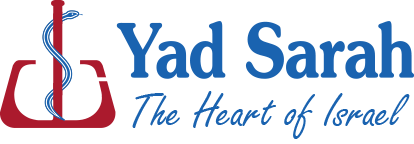
With the war Hamas imposed upon Israel surpassing two months, rocket sirens and explosions still riddle the southern Israeli city of Ashkelon on a near-daily basis.
Regarded as Israel’s “most targeted city,” Ashkelon has, since the atrocities of October 7, endured 1,380 rockets from Gaza – with some 200 landing and three hitting local hospital, Barzilai Medical Center. More than 2,000 city residents have sustained injuries during the war.
Located eight miles (13 kilometers) north of Gaza, Ashkelon residents have about 30 seconds to find shelter once rocket alert sirens start blaring. While some 40% of Ashkelon residents initially evacuated the city due to a lack of protected shelters, many are now returning. For individuals in the city who use wheelchairs or are homebound for medical reasons, the war has made day-to-day life particularly challenging and distressing.
Frontlines of Wartime Care & Rehabilitation
Against this backdrop, Yad Sarah’s Ashkelon branch has dutifully kept its doors open and its 73 volunteers on-call around the clock to fill over 1,800 requests for medical equipment since the war started.
The branch, located in a public bomb shelter, has been operating in emergency capacity and extended hours since the onset of the war.
Among the major changes branch manager Avi Peretz has seen since the war started are heightened demand for the delivery of medical equipment rentals and home care services as well as the provisioning of medical supplies at-no-cost to IDF soldiers stationed on the nearby frontlines and those rehabilitating at hospitals or at home. In the face of wartime needs, Peretz recruited the help of a woman who lives next to the branch, and is a Holocaust survivor, to unlock it when someone needs access to its stock of medical equipment during off-hours.
“Unfortunately, we’re already quite used to wars and conflicts living here in the South, but this has been different,” says Peretz while driving to the branch minutes after a rocket siren. “Because our branch is located in a bomb shelter, there’s lots of interaction with the public which is good for letting them know we’re here for them.”
Due to the broad evacuations from Israeli communities near the Gaza border in the early days of war, the Ashkelon branch has extended its aid services to many people from hard-hit towns and moshavim such as Sderot, Kiryat Gat, Ofakim, Netivot, and Kiryat Malachi.
Peretz explains that the branch works in collaboration with the Ashkelon municipality and social workers, who refer people to their services. This has included many Holocaust survivors and mobility-challenged individuals, dozens of whom Yad Sarah evacuated in the organization’s Nechonit – wheelchair-accessible vans.
The branch has also helped several households with individuals who use wheelchairs to repair or reconfigure their fortified rooms (mamad), enhancing accessibility and operational standards like fixing reinforced doors and air-tight windows to properly shut. Many have chosen to remain in their wheelchairs full-time, in order to save precious seconds and avoid accidents.
Lifeline of Life-Saving Services
In one example, Peretz and a group of Yad Sarah volunteers recently arrived at the Ashkelon home of Ora and Shalom Kahlon, whose daughter had requested their help to accommodate the space so her wheelchair-using father could get to the fortified room in time.
Speaking shortly after a rocket landed nearby in the city, injuring two, their daughter Smadar said, “Just now there was a siren, but he was on the couch and we couldn’t get him in the wheelchair in time. So we stayed outside and prayed that a rocket wouldn’t hit our house.”
Her parents had previously installed a ramp to the safe room so her father’s wheelchair could pass, however, it took them too long to get him to the fortified room from some parts of their house and the hoist to lift him in and out of the wheelchair couldn’t fit through the door frame.
The Yad Sarah volunteers demolished a wall as part of refurbishments in the hallway leading to the fortified room and also fixed the airtight steel door that didn’t close well. Yad Sarah’s Bnei Brak branch delivered a hoist that the local volunteers set up inside the safe room so the family didn’t have to rely on the one the family already used outside the room.
They have stayed in place since the war started, and didn’t want to evacuate because it would be too difficult technically for her father in his frail condition.
“Our family is extremely grateful for the huge help,” said Smadar. “Thanks to [Yad Sarah], we were able to set up a place for my father to sleep in the fortified room so that during sirens we can rest assured knowing that he is protected.”


